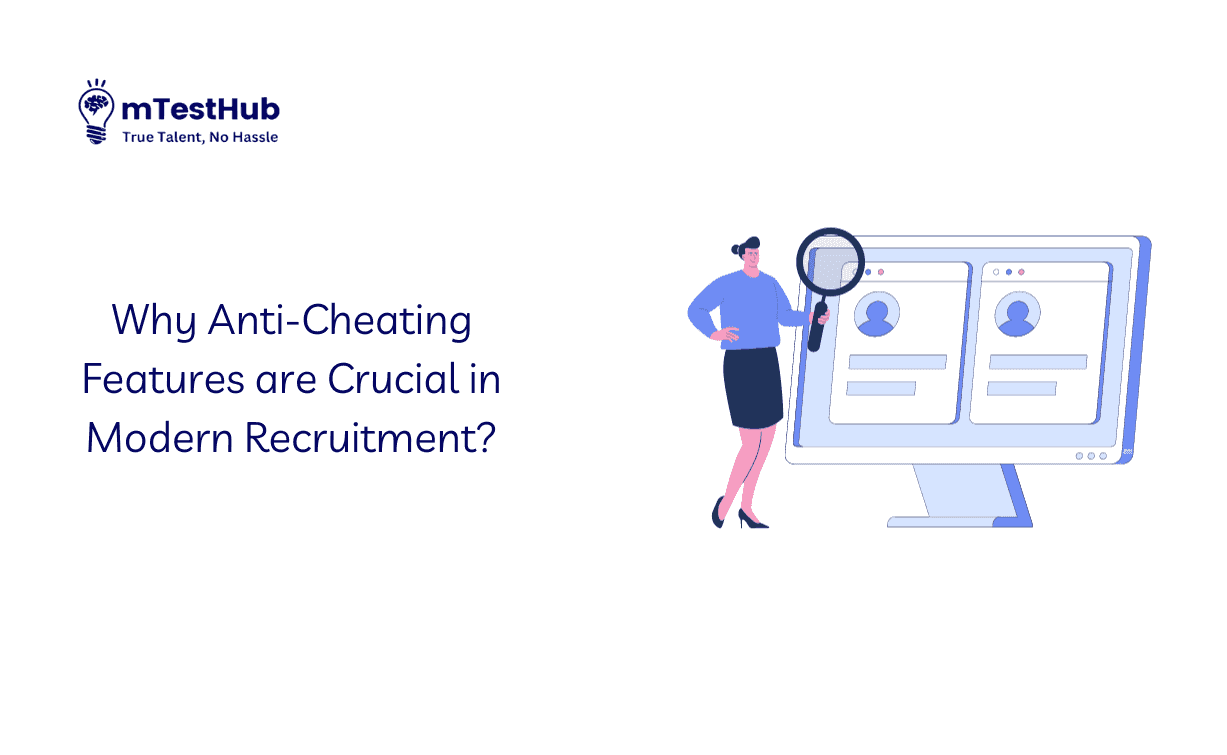Discover the importance of anti-cheating measures in recruitment for fair and accurate candidate evaluation. Learn how these features safeguard hiring integrity in our blog.


Product Marketer. MTestHub
In the current era of digital recruitment, ensuring the integrity of the hiring process has become more crucial than ever. The rise of remote hiring and online assessments has led to an increased risk of cheating, making anti-cheating features an indispensable part of modern recruitment strategies.
With a significant shift towards online assessments and virtual interviews, the opportunities for candidates to engage in dishonest practices have increased. A study by Talview indicates that 1 in 3 candidates admits to cheating in online assessments. This trend not only undermines the fairness of the recruitment process but also poses a risk to the quality of hires.

Implementing robust anti-cheating measures is vital to maintain the integrity and fairness of the recruitment process. It ensures that all candidates are evaluated on an equal footing, based on their true abilities.
The primary goal of any recruitment process is to identify the best talent. Anti-cheating features ensure that the assessment results accurately reflect the candidate's skills and abilities.
A recruitment process that is susceptible to cheating can damage a company's reputation. Ensuring a secure and fair hiring process enhances the employer's brand and builds trust among candidates.
Utilizing advanced proctoring solutions during online assessments can deter and detect cheating. This includes features like identity verification, browser lockdown, and real-time monitoring.
Creating a large pool of questions and randomizing them for each candidate makes it difficult for individuals to share answers or cheat.
Monitoring the time taken by candidates to complete tasks or answer questions can help identify unusual patterns that may indicate cheating.
Leveraging data analytics and AI can help in identifying patterns and anomalies in test responses, which might suggest dishonest practices.
Clearly communicating the use of anti-cheating measures enhances transparency in the recruitment process. This approach reassures candidates about the fairness and integrity of the hiring process, thereby improving their overall experience.
Knowing that measures are in place to prevent cheating can reduce stress among honest candidates, as it levels the playing field and allows them to showcase their abilities confidently.
Implementing anti-cheating measures must comply with legal standards and privacy regulations. Ensuring candidates' data security and privacy is paramount.
Utilizing anti-cheating technology upholds ethical hiring practices. It demonstrates a company's commitment to integrity, not just in its workforce but also in its operational procedures.
The use of AI-driven facial recognition and voice detection during online assessments helps in preventing impersonation and other forms of cheating.
Incorporating innovative assessment methods, such as situational judgment tests and gamified evaluations, can reduce the opportunities for cheating while providing a more engaging candidate experience.
Establishing a recruitment process that strongly discourages cheating fosters a workplace culture of integrity and honesty, which is beneficial in the long run for organizational health and reputation.
A robust and secure recruitment process attracts candidates who value integrity and honesty, aligning with the company's ethical standards.
The integration of anti-cheating measures in modern recruitment is a multifaceted approach that not only ensures the integrity of the hiring process but also enhances the candidate experience and upholds ethical standards. By embracing these technologies and practices, companies can build a trustworthy and efficient recruitment system, attracting the right talent while maintaining a high standard of operational integrity.
Be the first to know the latest hiring trends, product updates, and exclusive tips to streamline your recruitment process by joining our newsletter.

Streamlining Recruitment, Assessments, and Exams with AI-driven automation.
We use cookies to improve your experience. By continuing, you consent to their use. Do you accept?